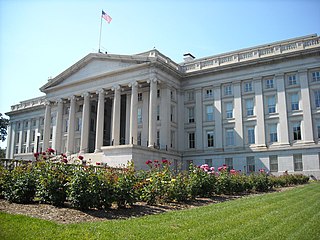Related Research Articles
A tax is a mandatory financial charge or some other type of levy imposed on a taxpayer by a governmental organization to collectively support government spending, public expenditures, or as a way to regulate and reduce negative externalities. Tax compliance refers to policy actions and individual behaviour aimed at ensuring that taxpayers are paying the right amount of tax at the right time and securing the correct tax allowances and tax relief. The first known taxation took place in Ancient Egypt around 3000–2800 BC. Taxes consist of direct or indirect taxes and may be paid in money or as its labor equivalent.
A dividend tax is a tax imposed by a jurisdiction on dividends paid by a corporation to its shareholders (stockholders). The primary tax liability is that of the shareholder, though a tax obligation may also be imposed on the corporation in the form of a withholding tax. In some cases the withholding tax may be the extent of the tax liability in relation to the dividend. A dividend tax is in addition to any tax imposed directly on the corporation on its profits. Some jurisdictions do not tax dividends.

Flag of convenience (FOC) is a business practice whereby a ship's owners register a merchant ship in a ship register of a country other than that of the ship's owners, and the ship flies the civil ensign of that country, called the flag state. The term is often used pejoratively, and although common, the practice is sometimes regarded as contentious.
Tax competition, a form of regulatory competition, exists when governments use reductions in fiscal burdens to encourage the inflow of productive resources or to discourage the exodus of those resources. Often, this means a governmental strategy of attracting foreign direct investment, foreign indirect investment, and high value human resources by minimizing the overall taxation level and/or special tax preferences, creating a comparative advantage.
Companies in the Republic of Liberia are regulated by a variety of laws. The corporate laws of Liberia were promulgated over 50 years ago to provide an offshore jurisdiction for ship owners and the international financial community. The LISCR has been appointed by the government of Liberia as its agent to manage corporate registry and to act as the sole entity for foreign companies registered in Liberia. The LISCR is headquartered in Dulles, Virginia, US and has an office located in Zurich, Switzerland.
Income taxes are the most significant form of taxation in Australia, and collected by the federal government through the Australian Taxation Office. Australian GST revenue is collected by the Federal government, and then paid to the states under a distribution formula determined by the Commonwealth Grants Commission.

Tax policy refers to the guidelines and principles established by a government for the imposition and collection of taxes. It encompasses both microeconomic and macroeconomic aspects, with the former focusing on issues of fairness and efficiency in tax collection, and the latter focusing on the overall quantity of taxes to be collected and its impact on economic activity. The tax framework of a country is considered a crucial instrument for influencing the country's economy.
Taxation represents the biggest source of revenues for the Peruvian government. For 2016, the projected amount of taxation revenues was S/.94.6 billion. There are four taxes that make up approximately 90 percent of the taxation revenues:

A merchant navy or merchant marine is the fleet of merchant vessels that are registered in a specific country. On merchant vessels, seafarers of various ranks and sometimes members of maritime trade unions are required by the International Convention on Standards of Training, Certification and Watchkeeping for Seafarers (STCW) to carry Merchant Mariner's Documents.
A tax haven is a term, often used pejoratively, to describe a place with very low tax rates for non-domiciled investors, even if the official rates may be higher.
Taxation in Denmark consists of a comprehensive system of direct and indirect taxes. Ever since the income tax was introduced in Denmark via a fundamental tax reform in 1903, it has been a fundamental pillar in the Danish tax system. Today various personal and corporate income taxes yield around two thirds of the total Danish tax revenues, indirect taxes being responsible for the last third. The state personal income tax is a progressive tax while the municipal income tax is a proportional tax above a certain income level.
Taxation in Norway is levied by the central government, the county municipality and the municipality. In 2012 the total tax revenue was 42.2% of the gross domestic product (GDP). Many direct and indirect taxes exist. The most important taxes – in terms of revenue – are VAT, income tax in the petroleum sector, employers' social security contributions and tax on "ordinary income" for persons. Most direct taxes are collected by the Norwegian Tax Administration and most indirect taxes are collected by the Norwegian Customs and Excise Authorities.
Transfer mispricing, also known as transfer pricing manipulation or fraudulent transfer pricing, refers to trade between related parties at prices meant to manipulate markets or to deceive tax authorities. The legality of the process varies between tax jurisdictions; most regard it as a type of fraud or tax evasion.
In Slovakia, taxes are levied by the state and local governments. Tax revenue stood at 19.3% of the country's gross domestic product in 2021. The tax-to-GDP ratio in Slovakia deviates from OECD average of 34.0% by 0.8 percent and in 2022 was 34.8% which ranks Slovakia 19th in the tax-to-GDP ratio comparison among the OECD countries. The most important revenue sources for the state government are income tax, social security, value-added tax and corporate tax.
Taxation in Belgium consists of taxes that are collected on both state and local level. The most important taxes are collected on federal level, these taxes include an income tax, social security, corporate taxes and value added tax. At the local level, property taxes as well as communal taxes are collected. Tax revenue stood at 48% of GDP in 2012.

Base erosion and profit shifting (BEPS) refers to corporate tax planning strategies used by multinationals to "shift" profits from higher-tax jurisdictions to lower-tax jurisdictions or no-tax locations where there is little or no economic activity, thus "eroding" the "tax-base" of the higher-tax jurisdictions using deductible payments such as interest or royalties. For the government, the tax base is a company's income or profit. Tax is levied as a percentage on this income/profit. When that income / profit is transferred to a tax haven, the tax base is eroded and the company does not pay taxes to the country that is generating the income. As a result, tax revenues are reduced and the country is disadvantaged. The Organisation for Economic Co-operation and Development (OECD) define BEPS strategies as "exploiting gaps and mismatches in tax rules". While some of the tactics are illegal, the majority are not. Because businesses that operate across borders can utilize BEPS to obtain a competitive edge over domestic businesses, it affects the righteousness and integrity of tax systems. Furthermore, it lessens deliberate compliance, when taxpayers notice multinationals legally avoiding corporate income taxes. Because developing nations rely more heavily on corporate income tax, they are disproportionately affected by BEPS.

Ocean Network Express Holdings, Ltd., branded as ONE, is a Japanese container transportation and shipping company jointly owned by the Japanese shipping Lines Nippon Yusen Kaisha, Mitsui O.S.K. Lines, and K Line. Launched in 2017 as a joint venture, ONE inherited the container shipping operations of its parent companies, corresponding to a combined fleet capacity of about 1.4 million TEU.
Taxation is an important part in the Turkish economy. Turkey has a 41.65% tax to GDP ratio. Most of the taxes are levied by central government. However some specific taxes are levied by municipalities, with the amount determined by centrally issued legislation. Municipalities have no authority to make their own tax laws.

Ireland has been labelled as a tax haven or corporate tax haven in multiple financial reports, an allegation which the state has rejected in response. Ireland is on all academic "tax haven lists", including the § Leaders in tax haven research, and tax NGOs. Ireland does not meet the 1998 OECD definition of a tax haven, but no OECD member, including Switzerland, ever met this definition; only Trinidad & Tobago met it in 2017. Similarly, no EU–28 country is amongst the 64 listed in the 2017 EU tax haven blacklist and greylist. In September 2016, Brazil became the first G20 country to "blacklist" Ireland as a tax haven.

The global minimum corporate tax rate, or simply the global minimum tax, is a minimum rate of tax on corporate income internationally agreed upon and accepted by individual jurisdictions in the OECD/G20 Inclusive Framework. Each country would be eligible for a share of revenue generated by the tax. The aim is to reduce tax competition between countries and discourage multinational corporations (MNC) from profit shifting that avoids taxes.
References
- 1 2 3 OECD/International Transport Forum (2019): Maritime Subsidies: Do They Provide Value for Money? Page 17-18.
- ↑ Merk, Olaf M. (2020). "Quantifying tax subsidies to shipping". Maritime Economics & Logistics. 22 (4): 517–535. doi: 10.1057/s41278-020-00177-0 . S2CID 228914535.
- ↑ "Voulue par l'industrie maritime, la taxe au tonnage vacille au parlement - Le Temps" (in French). 2023-03-17. ISSN 1423-3967 . Retrieved 2024-07-22.